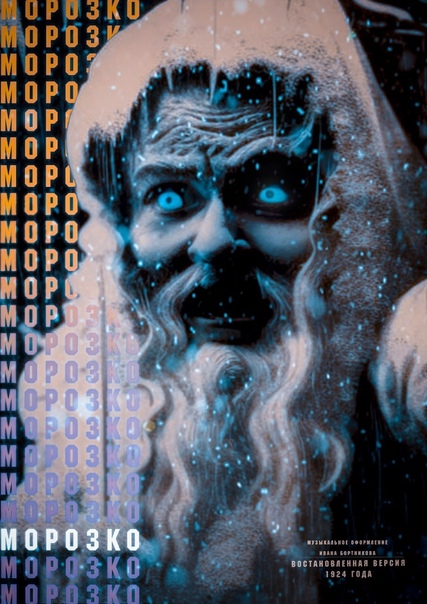 This little-known 36 minute silent is credited as the only Russian fairy tale film of the 1920s, and the premiere example of Soviet-made folk horror. Based on a Russian folk tale known, variously, as “Father Frost” and “The Story of King Frost,” and filmed at the short-lived Moscow based Mezhrabpom-Rus studio (1923-28), this 1924 film was promptly banned in its native land due to charges that it “reflected the ideology of the ruling classes, glorified the monarchy and hindered the development of a materialist worldview,” and stayed out of sight for 99 years. Its long-belated restoration was in March 2023, courtesy of the Russian cult film outfit From Outer Space. Calling MOROZKO a buried masterpiece would be a stretch, but it is memorable and disquieting.
This little-known 36 minute silent is credited as the only Russian fairy tale film of the 1920s, and the premiere example of Soviet-made folk horror. Based on a Russian folk tale known, variously, as “Father Frost” and “The Story of King Frost,” and filmed at the short-lived Moscow based Mezhrabpom-Rus studio (1923-28), this 1924 film was promptly banned in its native land due to charges that it “reflected the ideology of the ruling classes, glorified the monarchy and hindered the development of a materialist worldview,” and stayed out of sight for 99 years. Its long-belated restoration was in March 2023, courtesy of the Russian cult film outfit From Outer Space. Calling MOROZKO a buried masterpiece would be a stretch, but it is memorable and disquieting.
The director was Yuri Zhelyabuzhsky, who was in the midst of an especially fruitful year. 1924 also marked the release date of THE CIGARETTE GIRL OF MOSSELPROM/Papirosnitsa ot Mosselproma, Zhelyabuzhsky’s most famous self-directed film, and the science fiction classic AELITA, photographed by Zhelyabuzhsky. On MOROZKO Zhelyabuzhsky acted as his own cinematographer (as he often did on his directorial projects), and assembled an auspicious cast that included the famous Soviet thespian Boris Livanov (MININ AND POZHARSKY) in his film debut.
The MOROZKO folk tale was the subject of numerous cinematic adaptations. The most famous was Aleksander Rou’s 1964 version, which added a sorcerer, an evil witch and other extraneous elements to a very simple story, and did so in a high-spirited kid movie manner. Zhelyabuzhsky offers a more straightforward adaptation, with the tale’s non-kid friendly origins kept intact (the happy ending aside).
Full Movie Original Silent Film (1920s)
The situation: an elderly couple reside in a hut on the edge of a vast forest. Living with them are the old woman’s slothful daughter and beautiful stepdaughter Marfousha. The latter is treated abominably by her stepmother, who makes the girl do arduous chores, and eventually orders Marfousha’s father to take her into the woods and abandon her. This he reluctantly does, but Marfousha ends up saved by a snow-dwelling entity known as Morozko, a.k.a. Father Frost, who sports a formidable beard and a frizzy mop of white hair (resembling a scary Santa Claus).
Back home the evil stepmother orders her hubbie to reenter the forest and bring back Marfousha’s corpse. Yet he finds her very much alive, and bearing a crate-full of Morozko-bequeathed gold. The old woman sends her slothful daughter into the woods to meet Morozko and acquire more riches, but upon meeting the critter the girl is quite rude, leading to an outcome that’s far different, and darker, than that experienced by Marfousha. There is, however, a most unlikely happy ending that feels tacked-on.
All this is visualized via impeccably composed black and white imagery that demonstrates a wizardly pictorial sense. The snowbound outdoor scenery is conveyed, quite atmospherically, by montage editing reminiscent of the work of Zhelyabuzhsky’s contemporary Sergei Eisenstein.
Full Movie Remake (1964)
The From Outer Space minted restoration includes newly composed avant-garde music by Ivan Bortnikov (who incorporates the folk tunes “Two Merry Geese” and “The Finnish Polka”). The very up-to-date score doesn’t fit the period, but does add a suitably ominous aural accompaniment.
Vital Statistics
MOROZKO
Mezhrabpomfilm
Director/Cinematographer: Yuri Zhelyabuzhsky
Cast: Boris Livanov, Varvara Massalitinova, Vasili Toporkov, Klavdiya Yelanskaya
